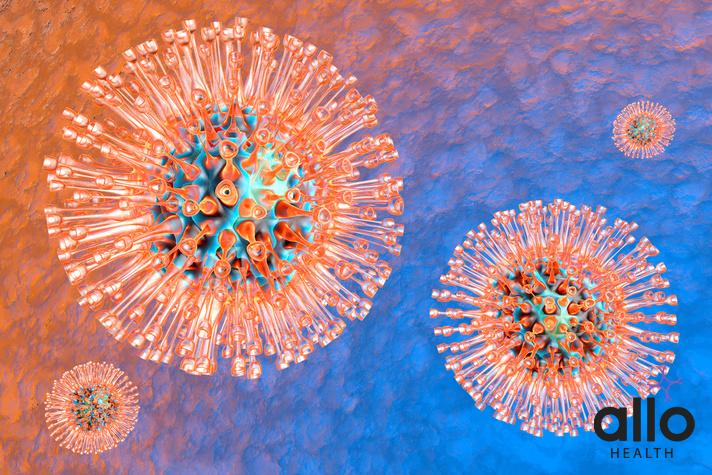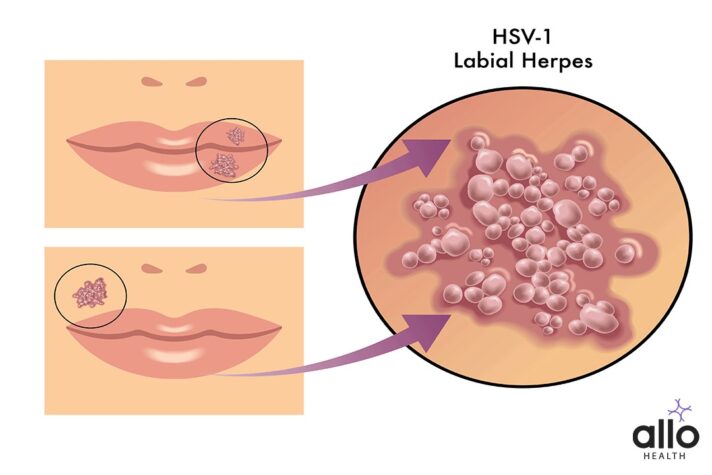Understanding Genital Herpes Type 1: Causes, Symptoms, and Treatments

Allo Health is dedicated to personalized well-being, offering support and trusted information tailored to individual health goals. The platform emphasizes human-generated content, led by a distinguished medical team of experts, including physicians and sexual health specialists. Their commitment to credibility involves rigorous fact-checking, authoritative research, and continuous updates to ensure accurate, up-to-date information. Allo Health's unique approach goes beyond conventional platforms, providing expert-led insights and a continuous commitment to excellence, with user feedback playing a crucial role in shaping the platform's authoritative voice.

Dr. Aditi completed her undergraduate medical education at AJIMS, Mangalore, after which she worked in multi-speciality hospitals with COVID patients and in the Pain and Palliative medicine department. Driven by her experiences, she developed a keen interest in psychiatry. Dr. Aditi believes that mental health is just as, if not more important, than physical health.
Why This Was Upated?
Our experts continually monitor the health and wellness space, and we update our articles when new information became available.
Updated on 22 June, 2024
- Article was updated as part of our commitment to diversity, equity, and inclusion.

"The following blog article provides general information and insights on various topics. However, it is important to note that the information presented is not intended as professional advice in any specific field or area. The content of this blog is for general educational and informational purposes only.
Book consultation
The content should not be interpreted as endorsement, recommendation, or guarantee of any product, service, or information mentioned. Readers are solely responsible for the decisions and actions they take based on the information provided in this blog. It is essential to exercise individual judgment, critical thinking, and personal responsibility when applying or implementing any information or suggestions discussed in the blog."
When it comes to sexually transmitted infections (STIs), there are several different types to be aware of. One of the most common is genital herpes, which is caused by the herpes simplex virus (HSV). Although most people associate herpes with “cold sores” on the mouth, there is also a type that affects the genital area. In this article, we’ll be discussing genital herpes type 1, including its causes, symptoms, and available treatments.
What Is Genital Herpes Type 1?
Genital herpes is a sexually transmitted infection (STI) caused by the herpes simplex virus (HSV). There are two main types of herpes simplex viruses: HSV-1 and HSV-2. Typically, HSV-1 is associated with oral herpes (cold sores), while HSV-2 is linked to genital herpes. It’s important to note that either virus can cause genital or oral infections.
Genital herpes caused by HSV-1 is often referred to as genital herpes type 1. Here are some key points about genital herpes type 1:
- Transmission:
- Genital herpes type 1 is primarily transmitted through sexual contact, including vaginal, anal, or oral sex.
- The virus can be transmitted even when there are no visible sores or symptoms, as it can be shed from the skin or mucous membranes.
- Symptoms:
- Genital herpes symptoms can vary, and some people may not experience any symptoms at all.
- Common symptoms include painful sores or ulcers on or around the genital or anal area, as well as flu-like symptoms such as fever, body aches, and swollen lymph nodes.
- Recurrent outbreaks may occur, but the frequency and severity can vary from person to person.
- Diagnosis:
- A healthcare provider can diagnose genital herpes through a physical examination and laboratory tests.
- Laboratory tests may include polymerase chain reaction (PCR) tests, viral culture, or blood tests to detect the presence of the virus or antibodies.
- Treatment:
- Antiviral medications such as acyclovir, valacyclovir, or famciclovir are commonly prescribed to manage and reduce the severity of symptoms.
- There is no cure for genital herpes, but antiviral medications can help control outbreaks and reduce the risk of transmission to sexual partners.
- Prevention:
- Using barrier methods such as condoms during sexual activity can reduce the risk of transmission.
- Avoiding sexual contact during outbreaks and being aware of prodromal symptoms (tingling or itching before sores appear) can also help prevent the spread of the virus.
It’s crucial for individuals with genital herpes type 1 to communicate openly with their sexual partners, practice safe sex, and consult healthcare professionals for proper management and guidance. Additionally, routine check-ups and screenings for STIs are important for overall sexual health.

Genital Herpes Type 1 Symptoms And Causes
Symptoms of Genital Herpes Type 1:
- Painful Sores or Ulcers:
- Genital herpes type 1 often presents with painful sores or ulcers in the genital or anal area. These sores can also occur on the buttocks or thighs.
- The sores may be small, red, and fluid-filled, and they can rupture, forming painful open ulcers.
- Flu-Like Symptoms: Individuals with genital herpes may experience flu-like symptoms during the initial outbreak. These symptoms can include fever, headache, muscle aches, and fatigue.
- Itching and Tingling: Before the appearance of sores, some people may experience itching, tingling, or burning sensations in the genital area.
- Pain or Discomfort During Urination: The presence of sores may cause pain or discomfort during urination.
- Swollen Lymph Nodes: Enlarged and tender lymph nodes in the groin area are common during an outbreak.
- Vaginal or Penile Discharge: Genital herpes can lead to an abnormal discharge from the vagina or penis.
- Recurrences: After the initial outbreak, some individuals may experience recurrent outbreaks with similar symptoms. The frequency and severity of recurrences can vary.
Causes of Genital Herpes Type 1:
- Herpes Simplex Virus Type 1 (HSV-1):
- The primary cause of genital herpes type 1 is infection with the herpes simplex virus type 1.
- HSV-1 is traditionally associated with oral herpes (cold sores), but it can also cause genital infections through oral-genital contact during sexual activity.
- Sexual Transmission:
- Genital herpes type 1 is primarily transmitted through sexual contact, including vaginal, anal, or oral sex.
- The virus can be spread even when there are no visible sores, as it can be shed from the skin or mucous membranes.
- Asymptomatic Shedding:
- People infected with HSV-1 can experience asymptomatic shedding, where the virus is actively present on the skin or mucous membranes without causing visible symptoms.
- This makes transmission possible even in the absence of noticeable sores.
- Direct Contact: The virus is typically transmitted through direct contact with infected skin or mucous membranes, such as during sexual intercourse.
- Vertical Transmission: In rare cases, genital herpes type 1 can be transmitted from an infected mother to her newborn during childbirth, leading to neonatal herpes.
It’s important to note that while HSV-1 is a common cause of genital herpes, HSV-2 is traditionally associated with genital infections. The distinction between the two is becoming less clear, as both types can cause genital or oral infections. Practicing safe sex, using barrier methods, and being aware of symptoms can help reduce the risk of transmission and manage the condition effectively. Individuals experiencing symptoms suggestive of genital herpes should seek medical advice for proper diagnosis and treatment.
Genital Herpes Type 1 Treatments
Treatment for genital herpes type 1 primarily involves managing symptoms, reducing the frequency and severity of outbreaks, and minimizing the risk of transmission to sexual partners. It’s important to note that there is no cure for genital herpes, but antiviral medications can help control the infection. Treatment options include:
- Antiviral Medications:
- Antiviral drugs are the primary treatment for genital herpes. They work by inhibiting the replication of the herpes simplex virus.
- Commonly prescribed antiviral medications include:
- Acyclovir: Available as oral medication, intravenous (IV) treatment, or topical cream.
- Valacyclovir: An oral prodrug of acyclovir, which is converted to acyclovir in the body.
- Famciclovir: Another oral antiviral option.
- Episodic Treatment:
- Episodic treatment involves taking antiviral medications during an active outbreak to reduce the severity and duration of symptoms.
- Treatment is usually initiated as soon as symptoms or prodromal (pre-outbreak) signs are noticed.
- Suppressive Therapy:
- Suppressive therapy involves taking daily antiviral medication to prevent or reduce the frequency of recurrent outbreaks.
- This approach can also decrease the risk of asymptomatic shedding and transmission to sexual partners.
- Pain Management: Over-the-counter pain relievers, such as acetaminophen or ibuprofen, may be recommended to manage pain and discomfort associated with genital herpes outbreaks.
- Topical Treatments: Topical antiviral creams, such as acyclovir cream, may be prescribed for localized lesions. Oral antiviral medications are generally more effective.
- Hygiene and Comfort Measures:
- Keeping the genital area clean and dry can help prevent secondary bacterial infections.
- Wearing loose-fitting clothing and avoiding tight undergarments may reduce irritation.
- Avoiding Triggers: Identifying and avoiding triggers that may contribute to outbreaks, such as stress, fatigue, or certain foods, can be beneficial.
- Counseling and Support: Individuals diagnosed with genital herpes may benefit from counseling and support groups to cope with the emotional and psychological aspects of the infection.
It’s crucial for individuals with genital herpes type 1 to work closely with healthcare professionals to determine the most appropriate treatment plan for their specific situation. Antiviral medications are most effective when taken as prescribed, and consistent communication with healthcare providers can help address any concerns or adjustments needed in the treatment approach. Additionally, practicing safe sex, using barrier methods, and informing sexual partners about the infection are important aspects of managing genital herpes.

Genital Herpes Type 1 Prevention
Preventing the transmission of genital herpes type 1 involves a combination of safe sexual practices, communication with sexual partners, and, in some cases, antiviral medications. Here are detailed preventive measures:
- Safe Sex Practices:
- Condom Use: Consistent and correct use of latex or polyurethane condoms during sexual activity, including vaginal, anal, and oral sex, can reduce the risk of transmission. While condoms do not provide complete protection, they significantly lower the chances of viral transmission.
- Dental Dams: For oral-genital contact, the use of dental dams (thin, latex barriers) can help reduce the risk of transmission.
- Avoiding Sexual Contact During Outbreaks: Refraining from sexual activity, including kissing and intimate contact, during active outbreaks of genital herpes can prevent the transmission of the virus to a partner.
- Antiviral Medications:
- Suppressive Therapy: For individuals with recurrent outbreaks, daily antiviral medications can be prescribed to reduce the frequency and severity of outbreaks. This also helps decrease the risk of asymptomatic shedding, lowering the likelihood of transmission to sexual partners.
- Regular Testing and Communication:
- Testing: Regular testing for sexually transmitted infections (STIs), including herpes, is important for individuals who are sexually active. Knowing one’s own and their partner’s STI status can guide preventive measures.
- Open Communication: Honest and open communication with sexual partners about one’s herpes status is crucial. Discussing the risks, using protection, and making joint decisions about sexual activity can contribute to a healthier sexual relationship.
- Avoiding High-Risk Activities:
- Oral-Genital Contact During Outbreaks: During an active outbreak of oral or genital herpes, avoiding oral-genital contact can prevent the spread of the virus.
- Sharing Personal Items: Refraining from sharing personal items such as razors, towels, or utensils can reduce the risk of indirect transmission.
- Understanding and Managing Triggers: Identifying and managing potential triggers for herpes outbreaks, such as stress, fatigue, or illness, may help reduce the frequency of outbreaks.
- Pregnancy Considerations: Pregnant individuals with genital herpes should inform their healthcare provider about their infection. In some cases, antiviral medication may be prescribed during pregnancy to reduce the risk of transmission to the newborn during childbirth.
- Regular Health Check-ups: Routine check-ups with healthcare providers can help monitor and manage genital herpes. This includes discussions about treatment options, preventive measures, and overall sexual health.
It’s essential to emphasize that while these preventive measures can significantly reduce the risk of transmission, they do not eliminate it entirely. Additionally, practicing good overall sexual health, including regular STI testing, communication with sexual partners, and understanding individual risks, contributes to a comprehensive approach to preventing the spread of genital herpes type 1.
Most Asked Questions
-
Can you get genital herpes type 1 from oral sex?
Yes, genital herpes type 1 (HSV-1) can be transmitted through oral sex. While HSV-1 is traditionally associated with oral herpes (cold sores), it can infect the genital area through oral-genital contact, leading to genital herpes type 1.
-
What are the symptoms of genital herpes type 1?
Symptoms of genital herpes type 1 include painful sores or ulcers in the genital or anal area, flu-like symptoms (fever, body aches), itching, tingling, and swollen lymph nodes. Some individuals may not experience symptoms, and the severity can vary.
-
Is there a cure for genital herpes type 1?
No, there is no cure for genital herpes type 1. Antiviral medications such as acyclovir, valacyclovir, or famciclovir can help manage symptoms, reduce the frequency of outbreaks, and lower the risk of transmission.
-
How is genital herpes type 1 diagnosed?
Genital herpes type 1 is diagnosed through a combination of physical examination and laboratory tests. Tests may include polymerase chain reaction (PCR), viral culture, or blood tests to detect the presence of the herpes simplex virus or antibodies.
-
Can you prevent the transmission of genital herpes type 1?
Transmission of genital herpes type 1 can be reduced by practicing safe sex, including the use of condoms and dental dams, avoiding sexual contact during outbreaks, and taking antiviral medications as prescribed. Open communication with sexual partners is crucial in preventing the spread of the virus.






































